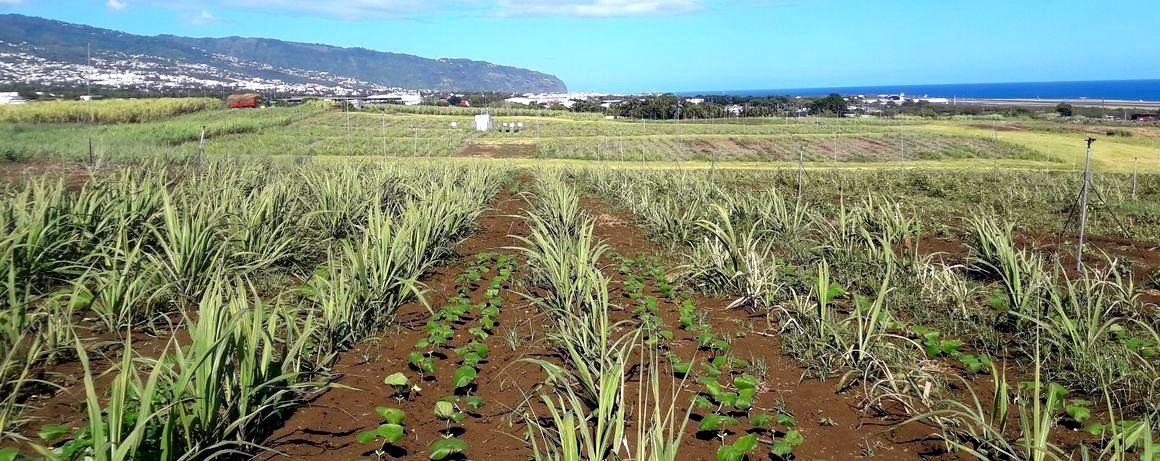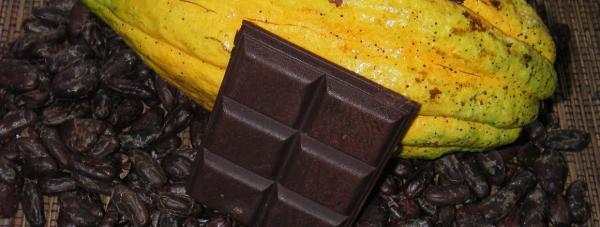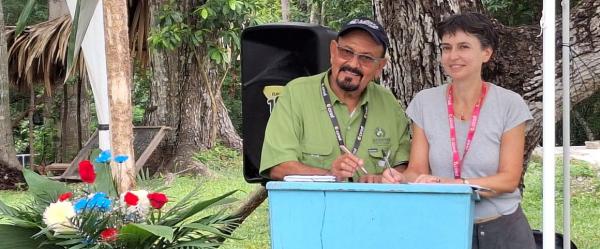Science at work 16 December 2025
- Home
- Press area
- Press releases
- Intercrops
Intercrops will benefit the farming and food systems of tomorrow

In Réunion, trials intercropping sugarcane with jack bean (Canavalia ensiformis), a service plant © M. Cristina, CIRAD
Food production is resource-intensive, and currently faces a range of challenges. The ancestral technique of intercropping, which consists in growing together different grain and legume species (or other mixed crops) in a given area at the same time, could be a solution.
“Although it is scientifically recognized as an agroecological solution, intercropping has been largely abandoned in Europe since the advent of fertilizers, in favour of monospecies cropping”, says CIRAD agronomist researcher Eric Justes and project coordinator. “Diversifying by means of intercrops is seen as both costly and complicated, since the majority of stakeholders in value chains are structured around standard processes, to produce, process and market those monocrops.”
A large-scale action research project was launched recently to lift the barriers to the adoption of intercrops: IntercropValuES. The four-year project, coordinated by CIRAD and with 7.4 million euros of funding from the EU Horizon Europe programme, centres on a range of innovations to be tested on three continents (in Europe, Africa and China).
Working to innovate, through 13 case studies
How can service plants, which supply nitrogen and help control weeds, be managed in sugarcane plantations in Réunion island? How does intercropping maize with cowpea, groundnut or cassava, boost the productivity of those food crops in Mozambique? How can agricultural machinery user cooperatives (CUMAs) adapt machinery cheaply, to sow, harvest and sort grains of intercrops efficiently?
These issues will be covered in the 13 case studies planned by the project, in ten countries: Denmark, France (three case studies, in Occitanie, Pays de la Loire and Réunion), Germany, Italy, Mozambique, Serbia, Spain, Sweden, Switzerland and the UK.
These studies will associate academic players, farmer groups and firms, focusing on shared objectives and an ambitious participatory co-innovation approach. By covering a wide range of situations (short and long value chains, organic and conventional farming, etc), the eventual aim is to build production methods and processing and marketing technology for the crops concerned.
“The project associates 27 of the world’s most experienced partners in terms of food crops. It will help us understand and model how these crops function in order to develop credible, effective and resilient solutions, from farm to fork”, Eric Justes explains. CIRAD will be working in mainland France (agrifood processing and agronomic modelling), Réunion, Mozambique (case study), and Senegal and Zimbabwe (genetics, agronomy and soil science).
Major potential for a broader rollout
The results of the project will subsequently be rolled out widely, adapting the messages and means of communication to the target users (farmers, farm advisors, processing firms, machinery manufacturers, distributors, citizens, scientists, public authorities). “The scientific community is the first level on which the results will be shared. On a local level, they will be rolled out to all the various agricultural development players via demonstrations in model crop plots, training modules or specific events. Lastly, by means of advocacy operations targeting national and European policymakers, we are keen to help to reorient the regulations and subsidies in favour of intercrops”, Eric Justes concludes by saying.
Partners in IntercropValuES:
• Austria: Universität Für Bodenkultur Wien
• Belgium: Université Catholique de Louvain/Katholieke Universiteit Leuven and International Federation of Organic Agriculture Movements European Union regional group Brussels
• China: China Agricultural University
• Denmark: Roskilde Universitet, Business Lolland-Falster
• France: CIRAD, ERCANE (Réunion), Institut National de Recherche pour l’Agriculture, l’Alimentation et l’Environnement (INRAE), Institut National des Sciences et Industries du Vivant et de l’Environnement, and Fédération Nationale des CUMA, AgroParisTech (partner affiliated to INRAE), Ecole Nationale Supérieure de Formation de l’Enseignement Agricole (partner affiliated to INRAE)
• Germany: Rheinische Friedrich-Wilhelms-Universität Bonn, Universität Kassel
• Greece: Aristotelio Panepistimio Thessalonikis
• Italy: Consiglio per la Ricerca in Agricoltura e L'analisi dell'economia Agraria, Rete Semi Rurali
• Mozambique: Universidade Eduardo Mondlane
• Netherlands: Wageningen University
• Serbia: Poljoprivredni Fakultet Novi Sad, Univerzitet U Novom Sadu
• Spain: Iniciativas Innovadoras S.A.L., Instituto Navarro de Tecnologias e Infraestructuras Agroalimentarias Sa
• Sweden: Sveriges Lantbruksuniversitet
• Switzerland: Forschungsinstitut Für Biologischen Landbau Stiftung



























